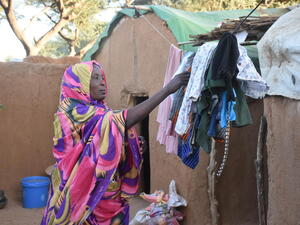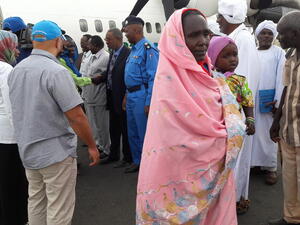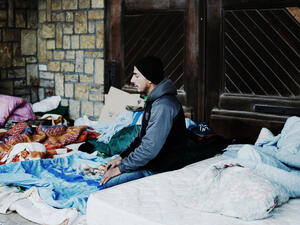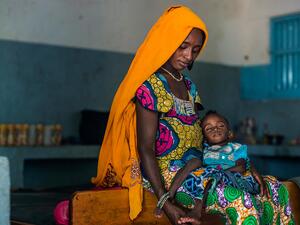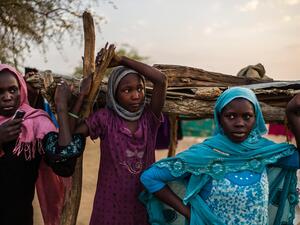Convoy transports more than 220 Chadian refugees from border areas in West Darfur to UNHCR-run camp
Convoy transports more than 220 Chadian refugees from border areas in West Darfur to UNHCR-run camp

Chadian refugees at the Chad-Sudan border load their luggage onto a truck that will form part of a convoy taking them to the Um Shalaya refugee camp in Western Darfur.
UM SHALAYA, Sudan, March 19 (UNHCR) - Some 550 Chadian refugees have asked to be moved away from border areas in Sudan's West Darfur area because of security concerns and a first group of more than 220 were moved at the weekend to the Um Shalaya refugee camp.
A convoy of 14 trucks, assembled by the International Organization for Migration and carrying 221 refugees and several donkeys, left Arara village on the Chad-Sudan border Saturday and arrived the next day at the UNHCR-run Um Shalaya refugee camp, which is located about 75 kilometres inside Darfur.
Staff from Save the Children US and Médecins Sans Frontières Switzerland provided medical assistance, while Sudanese police and Darfur-based troops of the African Union escorted the convoy.
Chadian refugees in the camp provided a warm welcome for the new arrivals, who were given construction materials to build shelters as well as non-food items, including plastic sheets, sleeping mats, blankets, kitchen sets, jerry cans, soap and other items. UNHCR opened Um Shalaya camp in May last year and before the latest arrivals it hosted 3,689 Chadian refugees.
Out of an estimated 20,000 Chadian refugees in West Darfur, some 16,000 have to date opted to stay close to the border in order to have better access to their farms and to be well placed to return quickly if the security threat ends.
But the security situation at the border has deteriorated in recent months and some 550 Chadian refugees, including the new arrivals in Um Shalaya, asked about a month ago to be moved to safer areas further inside West Darfur. The next convoy is expected to depart Arara on Friday.
Some of the Chadians already in Um Shalaya said they had found it hard adjusting to life in the camp. "Back home, many of us lived in brick houses. Traditionally our women and men live in separate rooms. Now we find ourselves all together in huts made of grass, sleeping on the floor," said Abdullah. "This is not easy, especially for the children," he added.
Hadida, who arrived in Um Shalaya last year, spoke to UNHCR as she weaved food covers from coloured dried grass outside the shelter she shares with her husband and three young children.
"Back home, the rebels visited us several times. They came, took our cattle and came again to take our food. When we had nothing left they came inside our houses," she recalled with a stony face. "Finally they attacked our village and burnt our huts."
Hadida, who is in her late twenties, revealed that many of the refugee women wanted to learn how to read and write. "But we don't have time," she said, adding: "Many of us found some work in the tobacco fields close to the camp, and then we have to collect firewood, cook and take care of our families."
UNHCR has been trying to create opportunities for the female population of Um Shalaya. Through its implementing partner Concern, the refugee agency has established a women's centre that offers skills training and counselling.
The popular centre is also used to spread awareness on issues such as health care, hygiene and female empowerment. The women of Um Shalaya hope that literacy classes and other training can be introduced there. Their menfolk, meanwhile, now want their own centre.
With more arrivals from the Chadian border expected over the coming weeks, Um Shalaya refugee camp is likely to grow. UNHCR, anticipating this, has drilled new wells in the camp and started to construct a school in the nearby village to provide education for both the refugees and their host community.
Despite the hardship, Hadida remains optimistic about the future. "I gave birth to my baby boy two months ago in this hut. I never wanted one of my children to be born in a refugee camp," she said. "But I wish for my boy that one day we can return home and that he can grow up in peace. Maybe he will become a doctor, to help others in need," Hadida added.
Since the Darfur conflict spread across the border into south-eastern Chad in late 2005, about 120,000 Chadians have been internally displaced and 20,000 have sought refuge in Sudan. UNHCR is assisting the Chadian refugees in Um Shalaya and the smaller Mukjar camp in West Darfur, as well as monitoring and providing protection assistance to Chadian refugees along the border.
The conflict that flared in the Darfur region in February 2003 has killed some 200,000 people and left at least two million internally displaced. A further 230,000 Sudanese refugees are living in 12 UNHCR-run camps in eastern Chad.
By Annette Rehrl in Um Shalaya, Sudan


